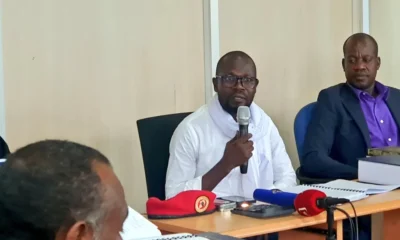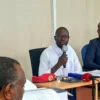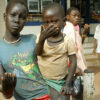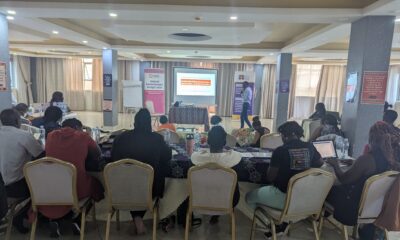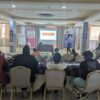News Feature
Seeds of fear sown in Busoga, confuse clonal coffee with coronavirus
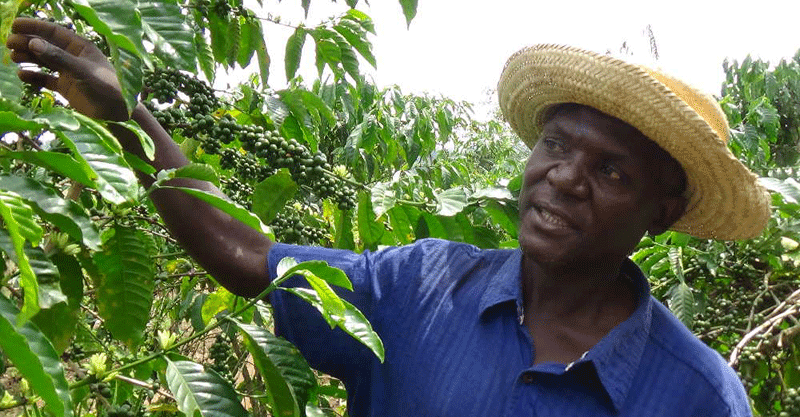
Charles Lwanga is a prominent clonal coffee farmer in Lwengo. He also supplies fellows with clonal coffee cuttings
The emergence of the fast-spreading coronavirus and its virulent COVID-19, have come with unprecedented conspiracy theories related to source, cause and effects of the virus.
While these are debatable, what isn’t in dispute is the ignorance taking a toll on the most gullible. In Uganda, where high-yielding clonal coffee has been grown for over 30 years with big dividends to farmers and to the nation, some anti-science minds are spreading fear by confusing clonal with corona (virus). This has led to some gullible farmers to even fear to go to their clonal coffee gardens, sources reveal.
The confusion, being created around the pronunciation of the two words – corona and clonal – is reportedly being propagated in the coffee-growing parts of Busoga.
Reports emerged mid-March on social media from the Eastern region – a major robusta-grower –indicating that farmers had been misled to think that their clonal coffee was related to the virulent pneumonic flu-causing SARS-Cov-2 or novel coronavirus currently killing hundreds of people across the world. This, reports add, triggered fear and panic among some farmers.
Mzee Johnson Kato, the Chairman of Kamuli Citrus Farmers’ Association and a coffee farmer, confirmed he had heard of the misleading rumours but quickly condemned the act, saying he has grown clonal coffee and knows it very well for its great values and benefits.
“I’ve heard of those rumours that must be originated by illiterate people in the neighbourhood of Kamuli. I cannot disassociate myself with this very useful and highly-productive coffee variety I’ve grown for over two decades, because some confusing elements have associated it with coronavirus that just emerged last year, on the world scene,” Mzee Kato told this writer.
He recalled that in the late 1980s when clonal coffee was introduced by former State Minister for Agriculture, the late Dr. Israel Kibirige-Ssebunnya, at that time a Director of the Kawanda-based National Agricultural Research Laboratories Institute, false rumours circulated that clonal coffee trees wouldn’t last long because they lacked tap-roots. “But I got my first clonal coffee in 1997 – twenty-three years now – and it still flourishes. I have fifteen acres which still exist. On top of fears that it wouldn’t last long, perpetrators of anti-science rumours also alleged that it would easily succumb to droughts. Today, all these have been proven as empty lies,” said Mzee Kato.
He blamed widespread illiteracy and gullibility among farmers—as fertile grounds that allow sowing and spreading of such negative campaigns. In the mid-1960s and mid-80s, coffee and banana-plantations were cut down and uprooted in several parts of Buganda, as political activists of Kabaka Yekka (KY) clashed with those from the Democratic Party (DP) and also when the UPC/Obote II Government was overthrown, its ruthless local chairmen’s plantations were cut down. From central Uganda [in Buganda], Mzee Ntambi Mulijji, a prominent coffee farmer in Mpigi District, says business rivalry is sometimes the source of the misleading rumours whereby one technology-producer takes advantage of a bad prevailing circumstance such as coronavirus and COVID-19, to associate a rival variety in order to malign it.
“We witnessed that kind of name-calling of a crop-technology to cause fear for it just like they’re calling clonal coffee as corona, today. I adopted clonal coffee in 1987 when it was fully developed from research that begun in 1960s by NARO. The late Dr. Ssebunnya and Dr. Musoli of the National Coffee Research Institute (NACORI) in Kituza, Mukono, were the key scientists behind clonal.
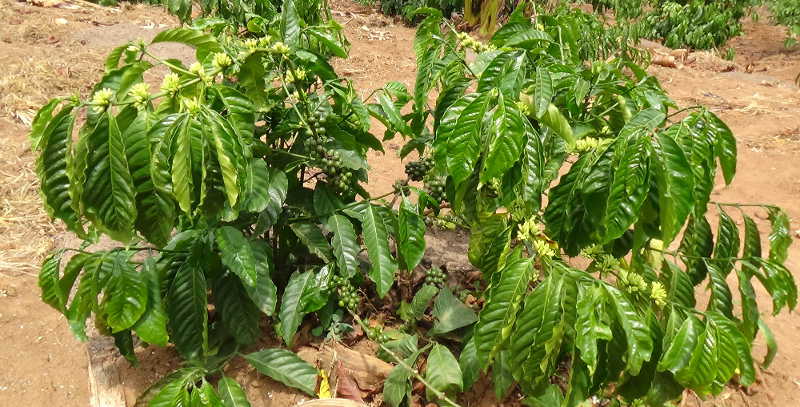
Clonal coffee starts to bear fruits after about 18 months of planting
It came onto the scene when an old conventional variety, that was already existing. A lot of entrepreneurs and scientists were dealing in the conventional coffee as a business, so they panicked when clonal coffee emerged on the scene. They crafted rumours that clonal does not last long in the field, and that it could not withstand droughts or dry spells. Today, its thirty-three years since I took on clonal, but it has survived all that time and on-and-off droughts. Thirty-three years is not a short time. Was the negative information about clonal, right? Not at all!” says Mulijji, a very progressive coffee farmer. He serves as Director in-charge of Development at the National Union of Coffee Agri-business and Farm Enterprises (NUCAFE), a private sector umbrella body for coffee farmers’ organization founded in 1995.
Mulijji also represents farmers on the state-run Uganda Coffee Development Authority (UCDA), the coffee regulator. Ntambi-Mulijji who is a promoter of new and more efficient technologies in communication, transport and agriculture, is all praises for clonal coffee. He runs a nursery that breeds coffee plantlets from clones (clonal means coffee plants developed from shoots of a coffee tree rather than from seeds, as do most plants develop.
Dr. Ssebunnya’s team at Kawanda identified and crossed six Robusta coffee clones, which are very high yielding and which had the most desired bean size.”
Mzee Mulijji wants UCDA to intervene urgently. He said: “I’ll request UCDA management to debunk the anti-clonal coffee propaganda. This is a coffee that fetches for breeders and nursery operators UGX 1,500 per plantlet from NAADS, (compared to just UGX300 for ordinary coffee seedlings). In addition, clonal coffee yields highly, giving farmers handsome returns by not only allowing flowering phases on the same stalk, but also by producing big bean size (known in coffee speak as superior screen size), that attract better prices than small coffee beans.
He recalled that anti-clonal propagandists of the late 1980s also alleged it [clonal] would kill the non-clonal coffees, without showing or explaining how.
“Clonal coffee raffled a lot of feathers, but their negativity didn’t fail it. We have sustained it and it has hugely benefited Uganda,” Ntambi emphasises. Today, Uganda earns over US$450m from coffee exports annually, and this represents 20 percent of all exports.
Mzee Ntambi further revealed that where farmers cut down coffee trees is in Butambala (a newer district recently curved out of Mpigi), to replace it with ginger.
“This spice is a more lucrative crop fetching UGX 200,000 per bag. One acre takes 8 kgs of seed, and on a higher side, yields 50 bags. So it gives UGX 1,000,000/- an acre per season. That’s where there’s uprooting of coffee. But it’s not very wise, still” Ntambi counselled.
He illustrates his point by saying: “Coffee is a long-term cash-cow because it is a perennial crop that lasts long when a farmer cares well for it. In addition, as more consumers abroad join coffee drinking, that’s great for us. One can keep harvesting and bulking coffee even up to 500 bags with good storage without selling, if that farmer has other income sources. It never wastes away. They’d pull out their 500 bags onto the market when the coffee prices are highest, they’d earn big and never regret their patience.”
Ntambi says such things cannot be done to ginger. “A farmer cannot harvest ginger and store or bulk it for many years like coffee,” he argued. He gave another example of cattle as incomparable to coffee, saying he has always told cattle-farmers during trainings, to use milk and cattle-sale proceeds to invest in coffee-growing.
“I tell them when they sell off cattle they sell off everything. But when one sells coffee, it’s only the berries they sell, not the trees. While both farmers earn money, the coffee farmers retain their trees that bear more coffee all the time, as long as the farmer lives and maintains his trees well.
A cattle farmer on the other hand cannot sell his cows and have them at the same time. Similar to the old saying that: ‘you cannot eat your cake, and have it.’
When milk prices fall, cattle-keepers pour away excess milk, but when coffee prices are low, a farmer can decide to store it, to sell when prices improve. For cattle-keepers, even proceeds from milk sales, can be invested in coffee.

Clonal Coffee comes from the science of making clones as seen in the above picture, which are plant shoots that are grown into full trees instead of planting seedlings
Views from Lwengo
Giving his perspectives on the corona-clonal confusion, Michael J. Ssali, a coffee farmer in Lwengo district, southern Uganda, too points at business rivalry between dealers in old coffee-varieties and those that breed/market newer and more popular clonal.
“I wouldn’t be surprised if there’s such fear-induced-confusion going on during this COVID-19-era. There are lots of rumours and misinformation – making rounds with all manner of assertions on coronavirus and COVID-19 via social media. We have anti-GMO and anti-Vaxx activists posting their own COVID-19 related theories and forwarding all manner of those from outside Uganda to Facebook and WhatsApp platforms, most of them misleading,” says Ssali, a teacher by training and also regular contributor to Daily Monitor’s Seeds of Gold publication.
Ssali says he has kept an 8-acre coffee plantation he inherited from his father in 1983.
“For me clonal coffee is a big money-minter over the years. It’s more tolerant to say, coffee wilt disease (CWD) than conventional elite. It bears bigger/heavier berries, that earn a farmer good kilos and prices,” he said. He says UGX 4,000 a kilo of Kasse (processed beans), Ssali explains, clonal is a big income-earner. I earn up to UGX 15m a year from clonal kasse. It’s good money, but I’m aiming at UGX 20m,” Ssali adds. He condemned what he termed as anti-science propagandists for sowing confusion relating clonal coffee to the corona virus.
Comments





